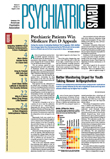Five significant predictors of bipolar disorder (BPD) risk—including comorbid anxiety and a family history of BPD—were found among patients treated for major depressive disorder (MDD) though they may not have had MDD, according to a recent study.
The study of predictors of BPD risk among patients treated for MDD found that the five leading predictors for BPD were a belief that “people were unfriendly,” comorbid anxiety, depression diagnosis within the preceding five years, family history of BPD, and past legal problems. The leading indicator—that “people were unfriendly”—was found in more than one-third of respondents who screened positive for BPD.
“We were surprised by that, but it makes sense because bipolar disorder patients are often irritable and project unfriendly feelings onto those around them,” said David Kemp, M.D., one of the study investigators. He discussed the findings at a poster presentation at APA's 2006 annual meeting in Toronto in May.
That feeling also could stem from a rejection anxiety, the investigators noted.
The study found that 100 percent of participants who endorsed all five of the predictor variables screened positive for BPD on the Mood Disorders Questionnaire. The portion of the sample of people with BPD screening positive dropped to 25 percent when they acknowledged having four of the predictor variables. The BPD rate was 41 percent, however, when patients had three of the risk factors—likely due to the fluctuating sample size for each risk factor group. Only 2.4 percent of patients with no risk factors screened positive for BPD.
The results stemmed from self-reported patient information and self-screening by 602 patients over age 18 in private practice and clinic settings who had at least one antidepressant medication failure during a current episode of MDD and had been in treatment for at least the three preceding months. Patients self-reported their demographics, family history, comorbid health status, alcohol or drug use, legal problems, and current depression symptoms through the Centers for Epidemiological Studies-Depression (CES-D) scale. The patients then self-screened for BPD by completing the Mood Disorders Questionnaire. Of the 602 study participants, 112, or 18.6%, screened positive for BPD.
None of the study participants had been diagnosed with BPD, OCD, schizophrenia, or schizoaffective disorder.
The study was undertaken in response to previous research that found that a substantial subset of patients who are diagnosed with unipolar major depression and do not show an adequate response to antidepressants actually had BPD. Patients with unrecognized BPD are misdiagnosed and incorrectly treated for an average of 10 years, the research found, which results in significant adverse personal, social, and work-related consequences.
Although 1 in 5 depression patients with one or more antidepressant medication failures screened positive for BPD, there was no correlation between the number of medication failures and the likelihood that the individual had BPD.
“We were thinking that more failures on antidepressants would make bipolar disorder more likely, but we didn't find that,” Kemp told Psychiatric News.
Previous research has suggested that despite the introduction of new classes of antidepressants and novel approaches to managing depression, at least 30 percent of patients with depression fail to respond adequately to antidepressant therapy, and remission rates in controlled clinical trials remain below 50 percent.
Participants in this recent study were taking an average of three antidepressants for their current episode of depression. More than 60 percent were found to be severely depressed at the time of the study, based on a CES-D score of at least 22.
Although the Mood Disorders Questionnaire BPD screener is rarely administered because of time concerns, clinicians should more fully assess for BPD in any patient with a depression diagnosis who endorses the risk factors identified in this study, Kemp said. He recommended routinely assessing for the risk factors as part of an initial diagnostic evaluation.
Clinicians also should talk to the patient's family about signs of mania or hypomania. Kemp noted that clinicians who opt to use the Mood Disorders Questionnaire also should be aware that it is considered less sensitive for related conditions—such as bipolar II disorder—so it may underestimate the presence of BPD.
The finding that comorbid anxiety predicts BPD risk is consistent with recent findings that suggest that more than 50 percent of bipolar patients experience at least one comorbid anxiety disorder.
Funding for the study was provided by GlaxoSmithKline. ▪
